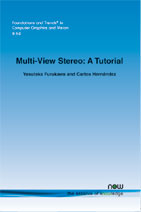Multi-View Stereo: A Tutorial
By Yasutaka Furukawa, Washington University in St. Louis, USA, furukawa@wustl.edu | Carlos Hernández, Google Inc., USA, carloshernandez@google.com
Abstract
This tutorial presents a hands-on view of the field of multi-view stereo with a focus on practical algorithms. Multi-view stereo algorithms are able to construct highly detailed 3D models from images alone. They take a possibly very large set of images and construct a 3D plausible geometry that explains the images under some reasonable assumptions, the most important being scene rigidity. The tutorial frames the multiview stereo problem as an image/geometry consistency optimization problem. It describes in detail its main two ingredients: robust implementations of photometric consistency measures, and efficient optimization algorithms. It then presents how these main ingredients are used by some of the most successful algorithms, applied into real applications, and deployed as products in the industry. Finally it describes more advanced approaches exploiting domain-specific knowledge such as structural priors, and gives an overview of the remaining challenges and future research directions.
Multi-View Stereo: A Tutorial
Multi-View Stereo: A Tutorial presents a hands-on view of the field of multi-view stereo with a focus on practical algorithms. Multi-view stereo algorithms are able to construct highly detailed 3D models from images alone. They take a possibly very large set of images and construct a 3D plausible geometry that explains the images under some reasonable assumptions, the most important being scene rigidity. Multi-View Stereo: A Tutorial frames the multiview stereo problem as an image/geometry consistency optimization problem. It describes in detail its main two ingredients: robust implementations of photometric consistency measures, and efficient optimization algorithms. It then presents how these main ingredients are used by some of the most successful algorithms, applied into real applications, and deployed as products in the industry. Finally, it describes more advanced approaches exploiting domain-specific knowledge such as structural priors, and gives an overview of the remaining challenges and future research directions.
